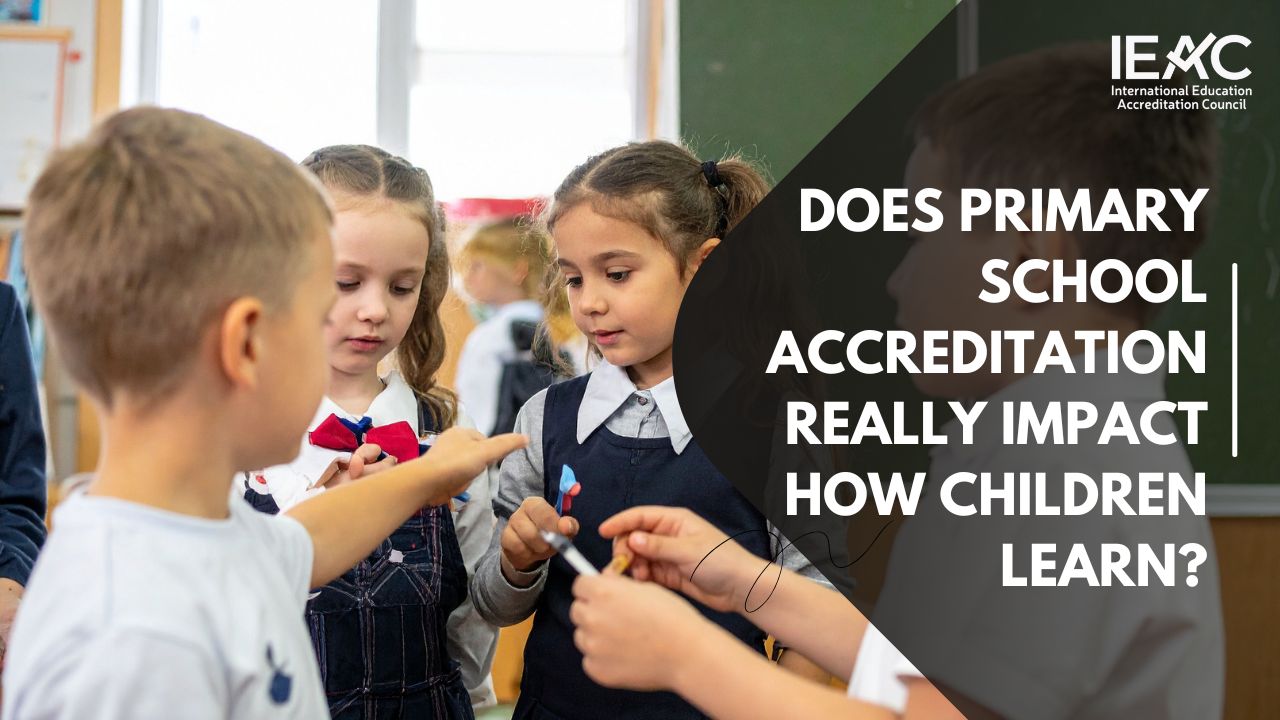- Home
- About IEAC
- Accreditation
- University Accreditation
- College Accreditation
- Online Institution Accreditation
- School Accreditation
- University Recruitment Agency Accreditation
- Programmatic Accreditation
- Teacher/ Lecturer Accreditation
- Religious Institutes Accreditation
- Affiliate Accreditation
- Research Accreditation Candidacy Accreditation
- IEAC Membership
- Institutions Accredited
- Accreditation Process
- Contact Us Webinar Apply Now
Blog
How School Accreditation Shapes Your Child's Future?
Lorem ipsum dolor sit amet, consectetur adipiscing elit, sed do eiusmod tempor incididunt ut labore et dolore magna aliqua. Quis ipsum suspendisse ultrices gravida. Risus commodo viverra maecenas accumsan lacus vel facilisis.

How School Accreditation Shapes Your Child's Future?
Every great education begins with trust — and accreditation is what builds it.
Choosing a school today isn’t just about academics, it’s about trust, credibility, and global recognition. In a world where students increasingly cross borders for higher education or careers, parents need assurance that their child’s qualifications will hold value anywhere. That assurance comes through School Accreditation.
Accreditation serves as an international quality benchmark, confirming that a school meets rigorous standards in teaching, governance, and curriculum. In global education hubs like the UAE, school accreditation plays a crucial role in aligning local institutions with international best practices and ensuring that students’ achievements are recognized worldwide.
In this guide, we’ll explore what school accreditation truly means, how it impacts your child’s educational journey, and why globally accredited schools are shaping the future of modern education.
What Is School Accreditation?
School accreditation is a process by which an independent external body rigorously assesses whether a school meets certain quality benchmarks, in areas such as curriculum, teacher qualifications, governance, facilities, student outcomes, and continuous improvement. Institutions that satisfy these criteria earn a formal accreditation status, which must usually be renewed periodically.
Accreditation comes in multiple forms:
- National / Regional accreditation — granted by government or regional educational authorities
- International / Global accreditation — conferred by bodies like CIS (Council of International Schools), WASC, IB, NEASC, or others
- Programmatic accreditation — specific to particular programs (e.g., science, arts) rather than the entire school
For international or mobile families, accreditation, especially School Accreditation in the UAE carries importance as it signals that the institution meets standards acknowledged beyond its home country.
The Global Landscape: Accreditation by the Numbers
To see why accreditation matters globally, consider some relevant statistics and trends:
- The Council of International Schools (CIS) supports accreditation for more than 1560 in 121 countries and has hundreds of school members undergoing evaluation.
- Accreditation in higher education also shows how selective standards are: for example, AACSB, a top accreditation body for business schools, notes that only 6% of institutions offering business degrees worldwide hold its accreditation, showing how rare and rigorous such endorsements are.
- Globally, education access is expanding, but quality and oversight remain uneven. UNESCO reports show that while primary and secondary schooling participation is relatively high, only a small fraction of higher education institutions is formally reviewed or benchmarked in many regions.
These statistics underscore that accreditation is not an omnipresent entity, it remains a distinguishing mark that not all institutions achieve.
Why Accreditation Matters for Your Child?
Accreditation is far more than just a label, it has real consequences:
- Validity of credentials: Many universities and scholarship bodies require that students come from accredited schools. An accreditation seal ensures your child’s transcript is recognized across borders.
- Mobility & transferability: If your family relocates (say, to the UAE or another country), attending an accredited school makes the transition easier.
- Quality assurance & continuous improvement: Accredited schools commit to regular review, updates in pedagogy, and adoption of best global practices.
- Credibility & trust: For parents, accreditation gives confidence in what’s behind the marketing, the curriculum, assessments, staff, and governance.
- Teacher and curriculum quality: Schools seeking accreditation often invest in better teacher training, more rigorous curriculum alignment, and internal monitoring.
In short, accreditation helps safeguard that your child’s education holds weight today and tomorrow.
Accreditation Systems Around the World
Different countries follow distinct frameworks for school accreditation, reflecting their educational priorities, governance models, and cultural contexts. Let’s get to understand these systems helps parents and educators recognize how global standards of quality are maintained, from the U.S. and Europe to Asia, the Middle East, and beyond.
- U.S. / North America
Here, accreditation is often regional (e.g. WASC, NEASC, SACS, etc.). Many colleges require graduation from a regionally accredited high school. Private and charter schools often pursue voluntary accreditation through recognized bodies.
- Europe
Many European countries rely on national inspection systems. But international and private schools often seek accreditation (e.g. by NEASC, CIS) to attract globally minded families.
- Middle East
Schools in the Middle Eastern region, like the UAE, frequently pursue school accreditation in UAE by bodies like NEASC, CIS, or local KHDA (for Dubai). This ensures alignment with international standards and supports expatriate families seeking consistency across global schooling.
- Asia & the Pacific
In India, only ~0.5% (7000 schools out of 15,00,000 schools), reportedly hold accreditation. In addition to national systems (state boards, ICSE, CBSE), more schools are exploring international accreditation to boost quality and global recognition. In East Asia and Southeast Asia, many international schools gravitate toward global accreditation for trust and mobility.
- Latin America & Africa
Many schools there are regulated by national authorities, but international or elite schools often acquire accreditation from bodies like CIS or NEASC to bolster credibility and attract global students.
How to Evaluate a School’s Accreditation?
When assessing schools (domestic or abroad), parents should use accreditation as a major filter. Here’s how to do it:
Ask the Right Questions
- Which accrediting body certified the school?
- When was the accreditation granted, and until when is it valid?
- Were there conditions or caveats attached?
Investigate the Accreditor
Not all “accreditation” is equal, some are honorary or unrecognized. Check whether the accreditor is respected, transparent, and peer-reviewed.
Review Performance & Audit Reports
Ask whether the school publishes evaluation audits, improvement plans, or summary reviews as part of its accreditation cycle.
Alumni Outcomes & Mobility
Look at where alumni go: Are they admitted into reputable universities? Do their credentials translate elsewhere?
These steps help distinguish between genuinely accredited schools and those with “accreditation” as mere marketing.
Special Cases: Boarding, International & Vocational Schools
Different types of schools operate under unique educational models, which means the standards and focus of school accreditation can vary widely. Whether it’s boarding schools nurturing holistic development, international schools catering to global learners, or vocational institutes emphasizing skill-based learning, accreditation ensures each maintains quality and accountability within its context.
- Boarding & Residential Schools: Accreditation matters even more here, as these institutions are judged not only on academics but on whole-person development (character, life skills, pastoral care).
- International Schools: They often carry multiple accreditations (local + international) to cater to a global population.
- Vocational / Technical Schools: Accreditation must align with industry bodies and qualification standards, especially for credential recognition in jobs or further studies.
Challenges, Trends & the Future of Accreditation
As the global education landscape rapidly evolves, school accreditation systems are being tested to keep pace with innovation, diversity, and digital transformation. Here are some of the challenges and emerging trends that are reshaping how accreditation is defined, measured, and maintained in schools worldwide.
- Standardization vs context: Balancing global standards with local relevance remains tricky.
- Rising accreditation costs: Many schools struggle with the financial cost of maintaining accreditation.
- Digital / hybrid learning models: Accrediting bodies are adapting to evaluate blended or online schooling.
- Transparency & public access: More systems are moving toward open reporting of accreditation data.
- Policy reform & regulation: Countries are strengthening regulatory frameworks to encourage or mandate accreditation (e.g. India’s NEP 2020 pushes for better quality assurance).
Final Thoughts
Choosing a school is one of the most consequential decisions for your child’s future. Accreditation offers an objective lens into quality, trustworthiness, and mobility. Whether you are assessing institutions in India, the UAE, or globally, school accreditation should be non-negotiable in your checklist.
And for families considering schools in the Gulf or other international hubs, understanding the school accreditation in UAE can help you make confident, future-proof choices, ensuring that your child’s education journey is both credible and unlocks opportunities worldwide.
Frequently Asked Questions (FAQ)
Q1. What exactly does a school accreditation certify?
An accreditation certifies that a school has met defined quality standards across curriculum, faculty, infrastructure, governance, assessment, and continuous improvement processes.
Q2. Does attending an accredited school guarantee my child’s success?
No. Accreditation is a strong signal of quality, but success also depends on the student, support systems, teacher quality, and home environment.
Q3. Can accreditation help if we move to another country?
Absolutely. Accredited schools are more likely to have recognized transcripts, making student transfers and admissions smoother across borders.
Q4. How do I verify a school’s accreditation status?
Check the accrediting body’s official website, ask the school for documentary proof, and verify whether the school appears on the accreditor’s directory.
Q5. Is accreditation expensive or time-consuming for schools?
Yes, it often requires resources, continuous monitoring, audits, and renewals. Many smaller schools struggle to keep pace, which is why accreditation is still relatively rare.






